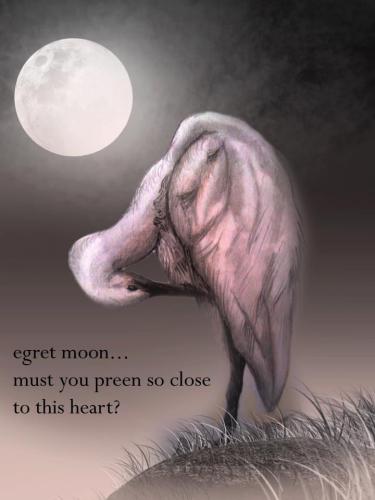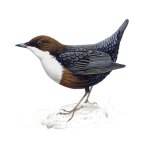The September issue of Haibun Today has now been published. As always, there are many fine examples of haibun and tanka prose, as well as excellent reviews and articles, including Melissa Allen’s review of Jeffrey Woodward’s recently published Evening in the Plaza: Haibun and Haiku and David Cobb’s article, “Transmissions of Haibun”.
Here is my tanka prose from the June issue (7:2):
The Golden Muse
“O for a Muse of fire, that would ascend the brightest heaven of invention.”
—Shakespeare, Henry V
Seated by the window, you stare into that space where all times are now. There you are, little more than a child, at the Galeries Lafayette, just about to catch Picasso’s eye. You’re buying a col claudine when he stops to tell you that you have an interesting face. He drops his name like a calling card. You’ve never heard of him— but he’d love to paint you! There you are again, brazen and bright as a beach ball, bouncing along the Plage de l’Ecluse with the key to his cabana. Did you ever walk as tall as he portrayed you: a giantess born of love’s palette, your head lost to the endless sky? And there you are, as the self-made noose tightens around your throat. Only you know the truth: are you slipping loose from your shackles, or tethering yourself to him in the hereafter? Oh, to wave my hand across your vacant expression! In another time, another place, who might you have been?
I
paying no heed to
the gently proffered bouquet
Manet’s Victorine
glassy-eyed queen
of the unmade bed
He said you saved his life, Marie-Thérèse. You, the unseen shadow, the secret code. Every curve, every saturated hue betrayed him. Brushstroke by brushstroke, his mouth was on your graceful neck, his arm was encircling your waist and you were the guitar waiting to be played; you were pitcher and fruit bowl, your very initials bifurcated by his. Fecund and sinuous, you were the black line that defined him, the sun through stained glass. Until, at last, he captured you while you slept naked in your armchair, head tilted toward the light, an open book in your lap. The truth now undeniable as the lyrical colours, the odour of the oils. But in another life, who might you have been?
II
the perfumes
of golden Byzantium
the mosaics
of Venice and Ravenna . . .
all eyes on Klimt’s Adele
Cast your mind back and find yourself returned to that hall of mirrors; in each glass, adjusted to his vision, do you see yourself as Picasso saw you, at one time or another? Which—if any—pleases you? The moon-white nude, bathing in her own light beneath the luxuriant foliage of the philodendron? or by the sea, that other nude, a strange coalescence of monster and seductress, all at once statuesque and vulnerable, sensual, yet clinically cold? . . . Perhaps it’s the tide that whispers, poor, poor Olga . . . Linger in reflection amid the still lifes; there is something of your smile in those red tulips. And there you are, wrought from wire and welded iron, his Daphne among the leaves in the chateau glade. Go deeper. Look closer. The hall has become a mirrorball and memory has set it spinning. In a blur of colour the Marne swirls you in its water-glass, spits you out in grisaille in Guernica, as the girl frantically running from left to right; the girl with a lamp at an upstairs window; the mother wailing for her dead child. So many lives that might have been yours. Canvas might liberate you, Marie-Thérèse, but flesh? Never. At least, not until—don’t think of that now . . . think of the dove, breasting her eggs. Were you not glad that was you? Your fellow captive, black as night, clawing and squawking inside the cage might have been you, in another life. Dora? War? Who might you have been, otherwise?
III
“Gala, it is
your blood with which I paint . . .
you are my bread”—
the woven arms and bared breast
of Dali’s la fornarina
IV
brushed into her braids
the soft spill of her hair
in darkness
the almost parted lips
of Wyeth’s Helga
And if Time, the greatest artist of all, could take one moment of your life and sculpt it from marble, or bronze, render it in oils or gouache, frame it with gold, or place it under glass, which would you choose? When were you happiest? Would you sit for him at Le Tremblay, with Maya on your lap, sometime during that sweet hour of eternity amidst the candles, the cut flowers, the fruit bowls, when Pic was the attentive lover, the devoted father? Or would you be on your bicycle, flashing through sunlight and shadow on your way to Boisgeloup to be mistress for the week while Olga was in Paris? Perhaps you’d wish to remain forever on the brink of womanhood, shopping at the Galeries Lafayette, your fingers about to brush that col claudine, the Master’s sleeve, the hem of immortality . . .
V
softly
from that Minoan shore
to the whetstone
of Phidias’ dream
and the fire of his blade
a patina
of coiled, breathing bangles
scale by scale
the snake goddess stripped
of her livery
and re-cast
from the patriarchal mould
the sloughed-off layers
of her sensual skin
trimmings for her aegis
a She-tower
of chryselephantine
commanding
swift allegiance
of the brave, the bold
graven image
robed in motionless gold
granite-eyed
and deathly cold as
the Gorgon at her breast
triumphantly
the glistening spear
and Winged Victory . . .
clandestine, at her feet
the limping smith-god’s child
a pedestal fit
for the Brightly-Crowned
Bringer of Strife:
the birth of Pandora
carved ivory relief
Golden Ages . . .
flowers from the garden
in a cobalt vase . . .
from the ray of a petal
pollen in the press of time
Author’s Notes
Images of Paintings cited in Tanka:
Dali’s la fornarina
Klimt’s Adele
Manet’s Victorine
Wyeth’s Helga
Prose:
Femme Assiss Pres D’une Fenetre (Woman Sitting Near A Window, 1932) by Pablo Picasso (1881-1973) is a portrait of Marie-Thérèse Walter, the artist’s “golden muse.” It sold at auction in February 2013 for £28,601,250. Marie-Thérèse (1909-1977) was Picasso’s French mistress and model from 1927 to around 1935. She was mother to his daughter, Maya. The affair began when Marie-Thérèse was 17 and Picasso was 45. He was still married to Olga (see below). Four years after Picasso’s death, 50 years after the couple first met, Marie-Thérèse committed suicide by hanging herself.
1) Olga Khokhlova (1891-1955), Picasso’s first wife.
2) Dora Maar (1907-1977), said to be Picasso’s “dark muse.” A skilled photographer, she recorded every stage in the development of Guernica (1937), arguably Picasso’s greatest masterpiece. Dora and Marie-Thérèse, rivals for the artist’s affections, are reputed to have wrestled each other, allegedly in front of Guernica, after Picasso told them to fight it out for themselves. In his painting Birds in a Cage (1937), Marie-Thérèse is depicted as the gentle, white dove, so Picasso’s preference appears to be clear.
3) Château de Boisgeloup: the country estate of which Olga was mistress at weekends while Marie-Thérèse resided there during the week.
4) col claudine, a Peter Pan collar.
Tanka:
(I) Victorine Meurent (1844-1927),the favourite model of Edouard Manet(1832-1883), inspiration for such works as Olympia (1863) and Le Déjeuner sur l’Herbe (1862-3).
(II) Adele Bloch-Bauer, painted by Gustav Klimt(1862-1918)in 1907.
(III) Gala Dalí, wife of Salvador Dalí(1904-1989). The Portrait of Galerina (1940-45) is a tribute to La Fornarina by Renaissance painter Raphael (1483-1520).
(IV) The Helga Pictures, a series of more than 240 paintings and drawings of German model Helga Testorf, (born c.1939), created by Andrew Wyeth (1917-2009) over the course of 15 years. The sittings were a secret even to the artist and model’s spouses. Braids was painted in 1979.
(V) Mycenaean culture flourished between 1600 BC when Helladic culture in mainland Greece was transformed under the influence of Minoan Crete, until around 1100 BC and the collapse of Bronze Age civilization. Long before the heyday of Athens, the northern patriarchal Hellenic tribes subverted the feminine, matriarchal Cretan goddesses (such as the Minoan snake goddess, protectress of hearth and home) whom they gave a new, masculine origin, making her acceptable to their patriarchal culture by clothing her in armour and making her subsidiary to an exalted Zeus (formerly a minor ‘year spirit,’ or consort to the goddess in Minoan culture). Athena Parthenos(Athena the Virgin), sculpted by Phidias (c.480-430 BC) and his assistants, and housed in the Parthenon. A massive gold and ivory sculpture of the city’s patron goddess, deemed the most renowned cult image of Athens.





